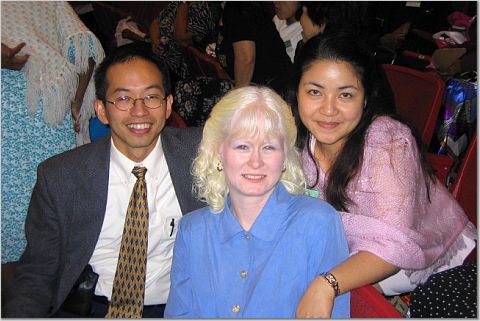Huh? Is This Indonesian?
"Dengerin gue..."
"Apa sih?"
"Gue mau ngomong nih."
"Hah, nggak ngerti. Ngomong apa sih lu? Jangan ngomong kaya gitu!"
"Aduh! Lu ngerti dan ngomong kaya gitu juga, kan?
"Pasti dong! Tapi nggak sekarang. Murid2 bahasa Indonesia aja nggak ngerti logat Jakarta kok."
"Oh iya, gue lupa. Oke deh. Ayo ngobrol nanti, ya?"
"Yuk."
Hearing a casual conversation like this would leave most learners of the Indonesian language thoroughly bewildered and wondering whether a major chapter of their language textbook hadn't in fact been ripped out when they weren't looking.
Welcome to the very real world of slang. Every language has it, and Indonesian is no exception. The most widely used Indonesian slang comes from Jakarta. The problem is that this essential colloquial language is omitted from almost all Indonesian learning books and programs. But if your Indonesian friends are from the island of Java, and most especially from the capital city of Jakarta, you will hear this strange chatter on a regular basis. So let's take a few minutes to crack the code and attempt to expose the true meaning of Indonesian slang, shall we?
"Gua or gue" and "lu" are popular slang forms of "me" and "you." Below is the progression from English, to very formal, to polite, to informal, and finally to Jakartaese.
I/me = saya = aku (or just "ku") = gua / gue
You = Ibu (or just "Bu") / Bapak (or just "Pak") = Anda = kamu (or just "mu") = lu
Other Jakarta slang words, many of which are included in the sample dialog above, are listed below, along with their relative meanings (though many are rather difficult to actually define)
aduh! = an exclamatory remark, often in a negative situation.
aja = saja = even, just, only
ayo = "Come on!" or "Good-bye."
deh = "Oh, all right" or "come on, please do"; may also be used like a word whisker at the end of a statement
dong = (1) "Of course!" (particle asserting that one should already know or do something); (2) used to soften a prohibition
gede = big, large
gini = begini = like this
gitu = begitu = like that
hah = an expression of wondering
kan? = bukan = is it not?
kaya = as, like (also written as "kayak") -- Note: when used as a non-slang word, "kaya" means rich, wealthy
kok = (1) "Why?" or "How come?" (when placed at the beginning of a phrase); (2) denial of a presumption or statement (when placed at the end of a phrase)
lho = (1) exclamation of surprise at learning something; (2) "you know?" (as confirmation of a statement or like the word whisker teenagers often use in English)
nah = (1) "See!" (particle implying acceptance of advice or opinion); (2) "Now then" or "Well" (particle introducing a new topic or a sentence used to conclude a conversation)
ngerti = mengerti = to understand
nggak = tidak = no / not (also written as "ga", "gak", "ngga", "enggak")
ngobrol = obrol = to chat
ngomong = omong = talk, chat
nih = this, here (particle pointing to something nearby)
nih? = "Are you sure?" or "Is it/are you not?" (requesting confirmation of something)
oh iya = "Oh yes, ...." (as though an afterthought. Just think of the TV detective, Columbo!)
oke = okay = OK
sih = (1) particle used to soften questions; (2) particle used to mark a topic; (3) "You know!" (like the word whisker teenagers often use in English)
udah = sudah = already
wah! = exclamatory remark (similar to "Wow!")
ya? = yes? / okay?
yuk = same meaning as "ayo"
Cracking the Code
Okay, let's revisit that mysterious gibberish from the outset of our discussion and see if we can't decode what is going on here.
"Dengerin gua..."
Listen to me....
"Apa sih?"
What is it?
"Gue mau ngomong nih."
I want to talk with you.
"Hah, nggak ngerti. Ngomong apa sih lu? Jangan ngomong kaya gitu!"
Hey, I don't understand. What are you saying? Don't talk like that!
"Aduh! Lu ngerti dan ngomong kaya gitu juga, kan?"
Oh my! You understand and talk like that too, don't you?
"Pasti dong! Tapi nggak sekarang. Murid2 bahasa Indonesia aja nggak ngerti logat Jakarta kok."
Of course! But not now. Indonesian language students won't understand Jakarta slang!
"Oh iya, gue lupa. Oke deh. Ayo ngobrol nanti, ya?"
Oh yeah, I forgot. Okay. We'll talk later, all right?
"Yuk."
Later.
This is not an exact translation, but the gist of the conversation.
As with any slang, true understanding comes by osmosis....or simply exposure to it over time. When you hear it, just try to get the general idea of what is going on. You will start to pick it up after a while. And don't be surprised if you start using it yourself!
Until then, whenever you encounter your slang-speaking Indonesian friends unintelligibly chattering, the books reviewed below are enlightening references that include most common Indonesian slang.
That's the lesson for this time. So....
Selamat belajar deh! ;-)
gabrielle
www.hello-indonesia.com
Kamus Indonesia Inggris -- An Indonesian-English Dictionary
This is a comprehensive dictionary that includes most slang and colloquial expressions. It is the gold standard in Australian schools that teach the Indonesian language. You may also want to check out its companion volume, Kamus Inggris Indonesia.Making Out in Indonesian
Even though we don't recommend that you actually use many of the phrases in this rather crude little book, it is useful as a basic reference guide to a lot of Indonesian slang. We also found that it contains some minor errors in the information provided, but it is so inexpensive that it is truly worth having it on your shelf.

